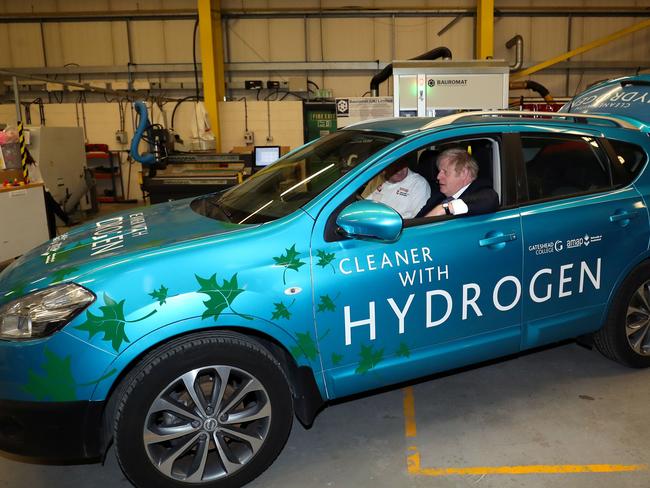Hydrogen our energy ‘hero’ says Australia’s Chief Scientist Alan Finkel
From coal and nuclear to wind and solar, Chief Scientist Alan Finkel has given his verdict on Australia’s different energy sources, and there’s a clear winner.
National
Don't miss out on the headlines from National. Followed categories will be added to My News.
Solar and wind power produce “the cleanest electricity you could imagine” but are “badly behaved” and cannot provide for the totality of Australia’s energy needs, the country’s Chief Scientist has said.
Speaking at the National Press Club in Canberra, Dr Alan Finkel made the case for hydrogen energy, describing it as a “hero” and saying Australia has “the potential to be one of the top three exporters of clean hydrogen”.
The global market for hydrogen could be worth $2 trillion by 2050, Dr Finkel said, although that would require the element’s price to be below $2 per kilogram.
Hydrogen had the advantage of being the “most abundant element in the universe,” although “nowhere on Earth can you drill a well and find hydrogen,” he said.
Dr Finkel’s address comes amid an increasingly divergent debate about Australia’s future energy needs, with Nationals MPs such as Barnaby Joyce and Matt Canavan calling for more coal-fired power plants, Liberal MP Dr Katie Allen calling for an “open mind” on nuclear, and independent MP Zali Stegall announcing her intention to launch a climate bill which would legislate for zero net emissions by 2050.
In his address to the National Press Club on January 29, Prime Minister Scott Morrison referenced hydrogen as one energy source Australia should look to in future, but natural gas would help “bridge the gap” until the technology was on par with traditional energy sources.
Dr Finkel said natural gas was helping other nations such as Britain transition to lower-emissions energy supply, but building new natural gas generators was “problematic”.
Stressing he was “technology neutral”, Dr Finkel said the cost of solar and wind energy was lower than gas-fired electricity generation, but because of reliability issues, they would need to be supplemented by other energy sources.
“Solar and wind produce the cleanest electricity that you could imagine,” he said. “But, you know, they’re badly behaved. They’re not always there when you want them. So you have to firm them up somehow. You can firm them up with batteries at cost. You can firm them up with pumped hydro, you can firm them up with hydrogen storage.”
Both hydrogen itself and the by-product of its extraction – water vapour – could both be classed as greenhouse gases in their own right, Dr Finkel said, but he said their effect would be minimal. Water vapour was a “short lived greenhouse gas,” he said.

When asked his opinion about the federal government’s decision to fund a study into the feasibility of a new coal-fired power station in North Queensland, Dr Finkel appeared to deflect the question, but said “there is no reason to attack coal because it is coal”.
Turning to nuclear power was also difficult because of waste issues and its economics, he said.
Although much has been made of the potential of small module nuclear reactors, Dr Finkel said it would be years before they were commercially installed anywhere.
Australia “would need to observe” the performance of such modules for several years, he said – adding that “small doesn’t need tiny” – and it was hard to see such units being considered as part of Australia’s energy mix before 2040.
Dr Finkel has been Australia’s Chief Scientist since January 2016. This is his last year in the role.

